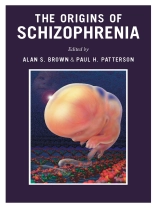The Origins of Schizophrenia synthesizes key findings on a devastating mental disorder that has been increasingly studied over the past decade. Advances in epidemiology, translational neuroscience technology, and molecular and statistical genetics have recast schizophrenia’s neurobiological nature, identifying new putative environmental risk factors and candidate susceptibility genes. Providing the latest clinical and neuroscience research developments in a comprehensive volume, this collection by world-renowned investigators answers a pressing need for balanced, thorough information, while pointing to future directions in research and interdisciplinary collaboration.
The book, featuring a foreword by Robert Freedman, M.D., thoroughly examines these topics from the vantage points of epidemiologic, clinical, and basic neuroscience approaches, making it an essential resource for researchers in psychiatry, psychology, and neuroscience and for clinical mental health professionals.
Inhaltsverzeichnis
Foreword, by Robert Freedman
Acknowledgments
Introduction, by Alan S. Brown and Paul H. Patterson
Overview: Schizophrenia and the Lifetime Trajectory of Psychotic Illness: Developmental Neuroscience and Pathobiology, Redux, by John L. Waddington, Robin J. Hennessy, Colm M. P. O’Tuathaigh, Olabisi Owoeye, and Vincent Russell
Part 1. Clinical Research on Risk Factors for Schizophrenia
Section 1. Environmental Factors: Epidemiologic Studies on the Etiologies of Schizophrenia
1. Maternal Infection and Schizophrenia, by Alan S. Brown
2. Prenatal Nutrition and the Etiology of Schizophrenia, by Kristin N. Harper and Alan S. Brown
3. Obstetric Complications and Schizophrenia: Historical Overview and New Directions, by Mary Clarke, Sarah Roddy, and Mary Cannon
4. Maternal Stress During Pregnancy and Schizophrenia, by Mary C. Iampietro and Lauren M. Ellman
5. Advancing Paternal Age and the Risk for Schizophrenia, by Sarah Crystal, Karine Kleinhaus, Mary Perrin, and Dolores Malaspina
6. Cannabis Use as a Component Cause of Schizophrenia, by Paola Casadio, Marta Di Forti, and Robin M. Murray
Section 2. Genetics and Epigenetics
7. Schizophrenia Genetics: What Have We Learned from Genomewide Association Studies?, by Alan R. Sanders, Jubao Duan, and Pablo V. Gejman
8. Genetic Architecture of Schizophrenia: The Contribution of Copy Number Variation, by Maria Karayiorgou, Rebecca J. Levy, and Bin Xu
9. The Epigenetics of Schizophrenia, by Iris Cheung, Mira Jakovcevski, and Schahram Akbarian
Part 2. Preclinical Research on Etiologies of Schizophrenia
Section 1. Animal Models of Environmental Factors and Schizophrenia
10. Animal Models of the Maternal Infection Risk Factor for Schizophrenia, by Paul H. Patterson
11. Developmental Vitamin D Deficiency as a Risk Factor for Schizophrenia, by Xiaoying Cui, Darryl W. Eyles, Thomas H. J. Burne, and John J. Mc Grath
12. Animal Models of Prenatal Protein Malnutrition Relevant for Schizophrenia, by Lisa M. Tarantino, Teresa M. Reyes, and Abraham A. Palmer
13. Animal Models of the Maternal Stress Risk Factor for Schizophrenia, by Paul H. Patterson
Section 2. Animal Models of Genetic Factors and Schizophrenia
14. DISC1: A New Paradigm for Schizophrenia and Biological Psychiatry, by David Porteous
15. Mutant Models of Nrg1 and Erb B4: Abnormalities of Brain Structures, Functions, and Behaviors Relevant to Schizophrenia, by Yachi Chen, Lorna W. Role, and David A. Talmage
List of Contributors
Index
Über den Autor
Alan S. Brown is Professor of Psychiatry and Epidemiology at Columbia University College of Physicians and Surgeons and the Joseph L. Mailman School of Public Health. He is also director of the Unit in Birth Cohort Studies at the New York State Psychiatric Institute. His honors include the A.E. Bennett Research Award from the Society of Biological Psychiatry, the Bingham Award for Scholarship in Schizophrenia, awards from the National Alliance for Research on Schizophrenia and Depression, and several distinguished lectureships.Paul H. Patterson is the Anne P. and Benjamin F. Biaggini Professor of Biological Sciences at the California Institute of Technology. Prior to arriving at Caltech, he served on the faculty of the Harvard Medical School for ten years. His honors include the Ulf von Euler Lectureship at the Karolinska Institutet, a Distinguished Investigator Award from the National Alliance for Research on Schizophrenia and Depression, a Javits Neuroscience Investigator Award from the National Institute of Neurological Disorders and Stroke Council, the W. Alden Spencer Award from the Center for Neuroscience, Columbia University, and a visiting professorship at the Institute of Psychiatry, King’s College, London.












